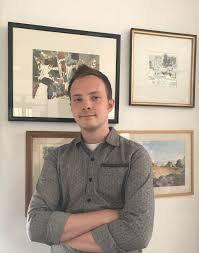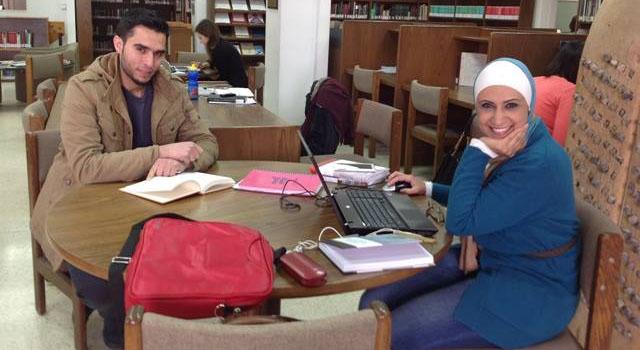You are here
Jordan media landscape ‘changed dramatically’ in past 20 years — American researcher
By Saeb Rawashdeh - Sep 23,2017 - Last updated at Sep 23,2017

Geoffrey Hughes
AMMAN — Jordan’s media landscape has “changed dramatically” in the past 20 years, which was the main theme of the lecture title “The Internet and the Social Media in Jordan’s Information Age”, held on Wednesday at the American Centre of Oriental Research( ACOR).
American researcher Geoffrey Hughes from the Anthropology Department, London School of Economics, opened his presentation by introducing the major players in Jordan’s online media.
“When I first came to the region in 2004, satellite TV was being celebrated as transformational,” he said, adding that by the time he first visited Jordan in 2006 rural communities where he lived were enjoying unprecedented access to the wider world.
In the realm of news, platforms like Al Jazeera and Al Arabiyya offered alternatives to state television and newspapers, Hughes added.
Few would have predicted that a mere five years later Internet-enabled smart phones would begin playing a role in yet another information revolution, the anthropologist noted, saying that this took a number of forms, the first of which was the so-called Arab Spring.
“But the transformation happened more subtly, beginning in 2007 when many of Jordan’s major online tabloids began their operations — sites like Ammon News, Khaberni, Saraya News and the more recent Al Wakil Al Akhbari now boast over a million-plus followers,” Hughes said, noting that “ they specialise in local news on the model of American local TV news where, ‘if it bleeds it leads’ as the saying goes”.
Their reports are dominated by crime stories, car accidents and, to a lesser extent, celebrity gossip, the scholar, who is the National Endowment for Humanities fellow at ACOR, said.
With their audiences in the millions — including both their Facebook followers and those who see their stories when their friends “like” them — online news sites enjoy a circulation that print media could never have dreamed of, he claimed.
“Most importantly, online commenting increases the interactivity of such media calling for a reaction from the reader,” Hughes noted, stressing that the experience of debating the issues of the day in writing with faceless strangers in an online environment represents “a new mode of subjectivation for millions of working class Jordanians”.
An important but much more difficult challenge is that of personal Facebook pages and public and closed Facebook groups, he continued, highlighting that that while Twitter, Instagram, Snapchat and WhatsApp are all used in Jordan, everyone from young people to professionals knows that Facebook is “by far the most important”, while Twitter is used by celebrities and people involved in politics.
The anthropologist who spent over four years studying the impact of the Internet and social media on the Jordanian society used three case studies for his research: the clash between Huwaytat and Maani in 2012, the assassination of Nahed Hattar last year and the controversy around the Lebanese rock band Mashroua Leila.
Hughes stressed that these events “are not normal, but they reflect more common dynamics in an extreme way, allowing us to see them more clearly than we normally would”.
Regarding journalism in Jordan, “one of the biggest challenges of working with journalists is that our methods and interests are so closely intertwined that it can be difficult to get theoretical purchase on their activities: we both conduct interviews, we read, we observe and we develop theories about political power, social change and economic problems”, Hughes pointed out.
“The big difference is that where journalists are trained to look at the who-what-where-when-why of the story [important people, organisation, and their various meetings] social theorists like me are trained to look at more abstract forces,” he noted.
“In some ways, this is good, because I will never have the level of insight into Jordan newsmakers that my friends in the Jordanian media have,” the scholar admitted, adding that journalists have extensive sources, they live here every day and they are extremely professional.
“ For too long, Americans mocked the Middle East as the home of conspiracy theories, dictatorship and censorship,” Hughes elaborated, adding “this is in spite of the fact that many of the most pivotal events in modern Middle Eastern history have been conspiracies: from Sykes-Picot to the invented rationale for the second Iraq war.”
Yet, increasingly Americans themselves seem to be learning the style of thought that Jordanians have honed for decades, for better or worse, he said, noting that senior members of the current US administration believe themselves to be at war with a “deep state”, itself a term “borrowed from Turkish politics”.
At the same time, the US opposition “tends to believe that it has been the victim of Russian electoral meddling”.
“My advice to Americans in the audience would be to study carefully the struggles of Jordanian citizens and journalists because they are way ahead of you,” Hughes concluded.
Related Articles
AMMAN — Given the numerous threats facing archaeological and cultural heritage sites in Jordan and the region, whether from war, development
AMMAN — For Geoffrey Hughes, a teaching fellow in the Anthropology Department at the London School of Economics (LSE), “every Jordanian with
Like thousands of young foreigners who came to the Kingdom to work for various international organisations and multinational companies or conduct academic research, Mary Pancoast also chose the capital as the next step in building her scholarly career.


















